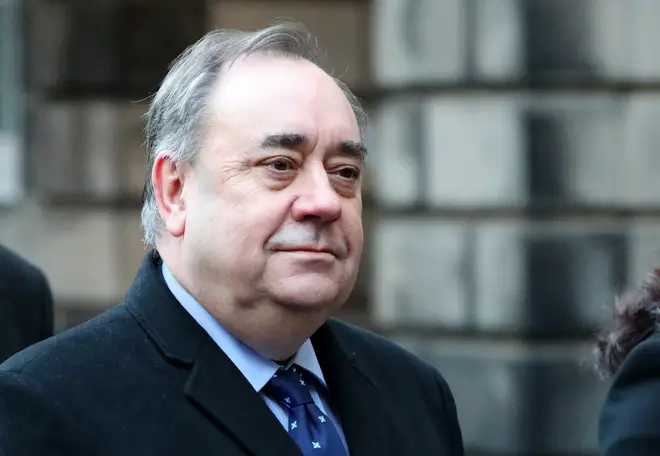
Natasha Devon 6pm - 9pm
8 February 2021, 19:45

Alex Salmond will not give evidence about the Scottish Government's botched handling of harassment allegations against him on Tuesday after raising legal concerns.
Meanwhile, Nicola Sturgeon and her husband - the SNP chief executive Peter Murrell - have both faced questions about their role in the saga.
The former first minister was awarded more than £500,000 when the Scottish Government conceded in a judicial review at the Court of Session its investigation into complaints made against him were unlawful.
He had been asked to appear before the committee inquiry into the Scottish Government's handling of the allegations against him on Tuesday, but his lawyers revealed he will not attend over concerns about the committee not publishing his evidence.
Mr Salmond's submission has been published elsewhere online and accuses Ms Sturgeon of breaching the ministerial code with "false and manifestly untrue" statements to parliament, which she denies.

Professor Peter Openshaw: UK should celebrate Covid vaccines
David McKie, of Levy & McRae, said that Mr Salmond "cannot take his oath to tell the whole truth and nothing but the truth" until a number of concerns were addressed, including the publication of the evidence by the committee and concerns about him being "in legal jeopardy".
He added: "Our client remains willing to give evidence to the committee at any point up to the final date for evidence (currently fixed for February 16)."
But in a previous letter, committee convener Linda Fabiani stated "no further dates can be offered".
A Scottish Parliament spokeswoman confirmed Tuesday's planned evidence session of the Committee on the Scottish Government Handling of Harassment Complaints was cancelled.
She added: "Mr Salmond had been contacted to make it clear that he can speak freely in committee about all of his contact with Nicola Sturgeon and his views on her actions.
"He was given the opportunity to make a lengthy opening statement on Tuesday and would have had four hours to answer questions in public. He was also invited to send more written evidence for publication after the meeting.
"The committee has already published two lengthy submissions from Mr Salmond and many, many pages of records and documents from him that he has been invited to speak freely about in Parliament on Tuesday.
"All of this written and oral evidence could then be reflected in the committee's report.
"The committee continues to communicate with Mr Salmond's representatives."
During a virtual evidence session of the committee on Monday morning, Mr Murrell denied lying under oath at an earlier appearance at the same inquiry about a meeting between Mr Salmond and Ms Sturgeon.
Mr Murrell was recalled to give further evidence to the committee after making contradictory statements during his first appearance.
He initially said he was not at home when the former first minister told Ms Sturgeon about claims he sexually harassed women, later he revealed he came home while the meeting was taking place on April 2 2018.
During Monday morning's session, Mr Murrell was asked repeatedly if he had made false statements to the committee under oath, which carries a maximum penalty of five years' imprisonment.
Challenged to give a yes or no answer about whether he gave a false account, Mr Murrell instead stressed he was not at the meeting and told MSPs he did not see Mr Salmond when he arrived at his Glasgow home.
Scottish Conservative committee member Murdo Fraser said Mr Murrell's appearance "can only strengthen" a prosecution case for possible perjury, while an SNP spokesman said the party's chief executive "answered questions honestly while maintaining anonymity of the women".
Coinciding with Mr Murrell's evidence, the SNP's chief operating officer Sue Ruddick called for messages from women who made complaints about Mr Salmond to remain private.
In an unprecedented move, the committee had asked for documents detailing text or WhatsApp communications between Ms Ruddick and Scottish Government ministers, civil servants or special advisers from between August 2018 and January 2019 which might be relevant to its inquiry.
The committee unanimously agreed not to publish them.
But in her statement, Ms Ruddick said: "It is becoming increasingly clear that the committee is determined to ignore complainers privacy rights and refer to, act upon and make public - whether in writing or through oral reference in a public session - private, confidential communications, despite having no lawful power to do so.
"Private communications between myself and Mr Murrell are in no way relevant to this committee's remit."
At the coronavirus briefing on Monday afternoon, the First Minister was also asked about the investigation into her predecessor and the suggestion the Scottish Government may have misled the Court of Session.
The First Minister's account - that she was first told about the sexual harassment claims by Mr Salmond at her home on April 2 2018 - formed part of the Scottish Government's defence during the judicial review of the investigation.
But it has since emerged that Ms Sturgeon met with Mr Salmond's former chief of staff, Geoff Aberdein, four days earlier and allegedly discussed the sexual harassment investigation.
Asked whether the Court of Session had therefore been misled, Ms Sturgeon said: "No, that's not the case, I refute that absolutely."
In her written evidence to the Holyrood inquiry examining the Government's botched investigation of Mr Salmond, Ms Sturgeon stated she had "forgotten" about the earlier meeting with Mr Aberdein until "late January/early February" 2019.